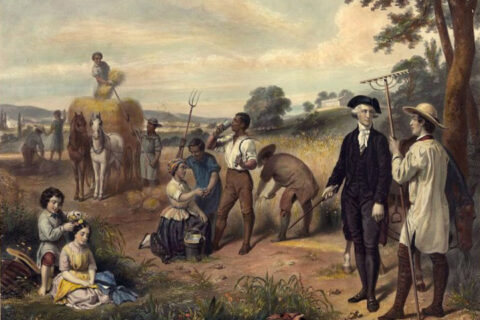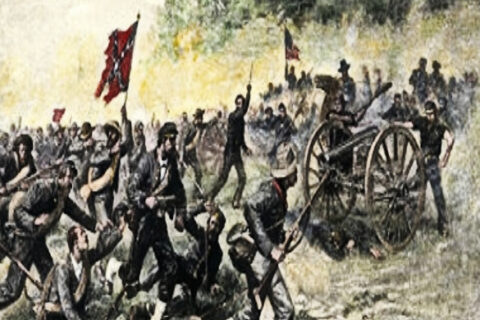Once, a mother watching her child searching diligently for something and seeing that she was having no success in her search, asked the tot where she had lost the missing item. The child replied, “I lost it over there,” pointing to the other side of the room. Somewhat confused, the mother said, “But if you lost it over there, why are you looking for it over here?” In all innocence, the child said simply, “Because the light is better!” Frankly, people often look for things “where the light is better” even when there is no chance of success, simply because it is easier. The history of the War of Secession – erroneously referred to as the Civil War – is a perfect example of seeking answers where the light is better, rather than in the darkness to which the facts have often been intentionally consigned.
But it isn’t just a matter of simplicity or ease. We have seen that abandoning the politically correct version of history produces unpleasant consequences for the individual involved. True scholars wish to correct what is false and bring to the fore that which was previously little known or even unknown. But, alas, those who stray from approved Yankee history engender actual hatred and spiteful retaliation and anyone involved in the field who departs – however slightly – from the “orthodox” narrative – that is, the academic Establishment’s party line – risks being exiled from the heritage community. Those who make a living in that community – guides, authors, managers of institutions, and lecturers – have been warned that inappropriate comments and unacceptable opinions will leave them in exile without invitations to symposiums, events, tours, column space, and other “Civil War” activities. Worse still, it is only the brave soul who is willing to face the specter of the ever-present and oft-played “race card” liberally used when anyone voices an opinion even vaguely supportive of the South. The field of history, at least in this subject, is more akin to an extortion racket than an academic exercise.
Let me offer two seminal examples of revisionist history easily proven to be lies but that are embraced by folks looking for the “easy truth” – you know, where the light is better. First, is the question of who started the war, the answer to which is always South Carolina with her assault on Sumter and the Flag; and, second, the question of the cause of the war which, according to what everybody is supposed to think, was slavery and nothing but slavery. In the first case, whenever the devastation wreaked upon the Southern people is mentioned, the Establishment tells us that no sympathy is due to them because, of course, the South fired the first shot and, therefore, legally and morally, started the war that the blessed Lincoln wished at all costs to avoid. But that is neither the definition of the matter under the law nor historically accurate – facts which Jefferson Davis pointed out even before Sumter was fired upon. Legally, the party that causes the first shot to be fired starts any war that supposedly results from that shot! If Sumter was fired upon without provocation, then the charge is, if not altogether accurate, requires at least some consideration; that is, that the Confederate States of America started the war! But the facts reveal that despite President Buchanan’s agreement with South Carolina not to rearm, re-supply, or re-man the existing Federal fort in Charleston, that is, Fort Moultrie, not Fort Sumter, given the existing circumstances, Lincoln with the help of General Winfield Scott before his inauguration had plans underway that involved Fort Sumter even though Sumter was no longer a federal facility having been returned to South Carolina when the Federal Government had failed to maintain the fort according to the lease, something that is made obvious by the fact that Sumter was filled with civilian workers attempting to repair and refurbish it when Major Anderson and his men from Fort Moultrie invaded Sumter on Christmas Eve, 1860.
There is insufficient time to go into the several attempts to aid Sumter – one of which caused Buchanan great embarrassment – or the actions by Major Anderson in disarming Fort Moultrie and moving its men and munitions to Sumter – an action that violated the agreement and caused great anxiety in Charleston. Neither is there time to tell of the lies Lincoln fed to sympathetic Northern newspapers about the ill treatment and starvation suffered by the men at Moultrie/Sumter – untrue according to Major Anderson’ own journal. And, finally, there is no time to present the evidence of the newly inaugurated president’s refusal to meet with Confederate ambassadors sent to avoid any actions that might lead to war, or Secretary of State Seward’s calculated efforts to deceive those ambassadors into believing that Sumter would be peacefully surrendered when in fact, the opposite was intended. All of this information is readily available on the internet and in many newer books. There are also Northern records and documents showing that Lincoln had planned to make use of Sumter to overcome Northern hostility to the use of force to keep the Southern States in the Union and that he had maneuvered the Confederate leadership into firing on Sumter knowing that the act would inflame the passions of the North and allow him to go to war against States that sought only a peaceful departure from the old compact. Indeed, Lincoln admitted that he obtained his desired ends at Sumter in a letter to Gustavus Fox on May 1st, 1861, in which he stated:
“You and I both anticipated that the cause of the country would be advanced by making the attempt to provision Ft. Sumter, even if it should fail; and it is no small consolation now to feel that our anticipation is justified by the result.”
The result and the cause of the country that Lincoln wished to advance, was, of course, the war that the firing upon Sumter brought about. On July 3rd of that same year, Lincoln confided to Orville H. Browning, a close personal friend, about the plan to supply and reinforce Sumter and its true intentions:
“The plan succeeded. They attacked Sumter—it fell, and thus did more service than it otherwise could.”
There is no doubt that the event that (quote) started the war (unquote) was a well laid, devious and wicked plan conceived by Abraham Lincoln and carried out with the assistance of Chief General of the Armies Winfield Scott who chose to disobey the orders of his Commander-in-Chief, President Buchanan, and participate in an act that began a bloody, barbaric, illegal, immoral, and unconstitutional war – a war that destroyed the Republic and the Union, enslaved eleven states for as many years, and made traitors out of Lincoln, Scott and all who knowingly participated in its waging on the part of the Federal Government in its guise as the Union. For the only act in the Constitution given the name treason is that of waging war upon any of the signatory Sovereign States. Even the bombardment of Sumter, provoked or otherwise, could not be called treason. To begin with, Sumter belonged to South Carolina which had leased the land and its structures to the Federal Government. But, even more to the point, the Federal Government was not a Sovereign State as defined by the Constitution and, therefore, no treason obtained in the assault on its agents illegally occupying that facility.
As for the institution of slavery being (quote) the*cause*of*the*war (unquote): the issue of slavery is far more complex than the simplistic nonsense used today to make villains of those in the South and heroes of those in the North. However, in truth, while the institution was of no interest to the Yankees as anything other than a means of making money prior to the early 1800s, the black man – slave or free – was of paramount interest. The people of the North made it plain that they did not want black faces in their white States and as soon as an abundant supply of cheap labor became readily available with the influx of thousands of European immigrants, black slavery was ended, or at least redefined. For instance, New Jersey ended slavery by defining all black slaves as unpaid apprentices for life. Lincoln later declared that New Jersey’s slaves would probably be emancipated by 1914! In other Northern states, the majority of black slaves were not freed, but rather moved to Northern owned plantations in the West Indies or sold South, thus solving the problem and making a profit. Meanwhile, so-called black codes were enacted in almost all States and territories outside of the South which refused blacks – slave or free – the right to even enter much less settle in those States and territories – another little known or acknowledged fact.
Even with the rise of radical abolitionism, there was no concern for the welfare of blacks. Abolitionists made it clear when pressed that they had no love for the slave, but rather that their actions were dictated by hatred of the white master! Indeed, almost from the beginning of the nation’s history, the New Englander held Southerners in contempt for many reasons, not the least of which was their perceived personal familiarity with what was termed the African. New England newspapers after Jefferson’s election complained about our (quote) new black president and various black members of Congress from the South (unquote). Since those named were all white, it is obvious what Yankees thought of their Southern brethren. As well, contrary to what most believe, there was a serious abolition movement in the South which was silenced by the rise of Northern plans to encourage servile insurrection such as had happened in Haiti, and in what came to be known as Nat Turner’s revolt.
Parenthetically, it is interesting to note that Lincoln’s Emancipation Proclamation was not designed to free America’s black slaves. First, of course, the presidential decree was limited to those states not under the control of the Federal Government. Slaves living in states either remaining in the Union or occupied by Federal troops remained in slavery until the adoption of the second 13th Amendment. So, if Lincoln did not (quote) free the slaves (unquote), what was the intent of the Proclamation? Simply this: Lincoln believed that slaves learning that they had been freed by the all-powerful central government would look upon themselves as no longer owing service or allegiance to their former masters and would rise up and attack their homes and persons. Furthermore, fearing just such a bloodbath, Confederate soldiers would desert the army in droves and return home to protect their families and property. This was the aim of the Proclamation – pure and simple. It had nothing to do with freeing anybody; it was a military measure designed to weaken the Confederate armed forces and, as such, it failed.
But there is a further obvious proof that slavery did not cause the war. Again, it is fairly well known but virtually unacknowledged that even as some Southern States seceded, an amendment to the Constitution was proposed and was in the process of ratification which would have placed slavery into the Constitution itself in such a way that the Amendment could not be later revoked by Congress. The Corwin Amendment – the first 13th Amendment – was a sop to the States of the South to keep them in the Union. Lincoln referred to it but declared that he had not seen it. However, he was certainly one of those acting behind the scenes and may well have actually drafted the thing. Remember, Lincoln didn’t want a war unless secession could not be prevented any other way. What he wanted was the revenues from the South obtained through tariffs and, especially, the newly passed Morrill Tariff. These revenues he then could distribute to Northern commercial interests under the so-called American System of corporate welfare. If he could keep the nation together by the continuation of slavery, Lincoln was more than happy to do so. Corwin proves that if slavery had been the reason for secession, this perpetual guarantee of the institution would have immediately caused all such efforts to cease. Indeed, many wealthy planters wished them to because their futures were assured under the Constitution. That the efforts continued, and spread, clearly indicates that the cause of secession and hence of the war, was not (quote) slavery and nothing but slavery (unquote). It is interesting to note that when this canard is offered by today’s scholars and historians, the Corwin Amendment – which totally disproves their point – is dismissed out of hand when it is mentioned at all. In fact, the Amendment cannot be acknowledged, and their viewpoint logically sustained, so it must be denied or explained away however intellectually dishonest they know that to be.
Equally important in any examination of the causes of secession is the matter of tariffs. Few indeed are the wars fought for reasons other than those economic in nature. For money is power and power is money; the two cannot be divorced. In May of 1860, the U.S. Congress passed the above-mentioned Morrill Tariff Bill – named for Republican Congressman and steel manufacturer, Justin S. Morrill of Vermont – raising the average tariff from about 15% to 37% with increases to 47% within three years. Although this was remarkably reminiscent of the Tariffs of Abomination which reached 50% in 1832 and had led to a constitutional crisis and threats of secession and armed force, the U.S. House of Representatives passed the Bill 105 to 64. Out of 40 Southern Congressmen only one, who was from Tennessee, voted for it. The South already paid 87% of the tariff revenues which protected Northern industrial interests while raising the cost of living and commerce in the South and reducing the trade value of their agricultural exports. Obviously, such effects combined to place a severe economic hardship on many Southern States. But even more galling was that 80% or more of these tax revenues were expended on Northern public works and industrial subsidies – the so-called American System mentioned earlier – thus further enriching the North at the expense of the South.
Now, we must remember that Lincoln had been elected on the promise of raising tariffs and his support, including money, came from Northern and Mid-Western businessmen who needed those federal revenues. Indeed, many Northern newspapers that had originally supported the right of Southern States to secede, rethought their position when they realized what that loss of income would mean to their own economic interests. As for Lincoln, his policy of corporate welfare and payments to such private interests as the railroad insured not only his political future, but his financial prosperity once he left office. A lot of folks have wondered why General McClellan treated his Commander-in-Chief Lincoln with such contempt. Well, McClellan was a lawyer with the same railroad that employed Lincoln and old George knew that Lincoln got his nickname “Honest Abe” for the same reason that Robin Hood’s very large lieutenant got his sobriquet, “Little John!” Indeed, rather than being a testimony to Lincoln’s honesty, “Honest Abe” was a sarcastic reference to the fact that Lincoln was a shyster lawyer looking to feather his nest whenever the opportunity presented itself, something that he could not do – neither could he build the much desired “American Empire” – without the States of the South remaining in the Union even at the point of a bayonet.
Friends, we have seen that the two great myths of the War of Secession – who started it and why it was waged – are just that: myths. In fact, they aren’t even myths because myths ultimately have some foundation in truth while these fables are at best mistaken interpretations of the facts and at worst intentional lies designed to forward an agenda antithetical to justice, to history, and to the South. However, they serve as handy weapons in the campaign of cultural genocide being waged against Southern history, heritage, and heroes since the 1950s and we should recognize and be aware of that fact. Indeed, all honest people upon hearing them pronounced by Establishment scholars and historians or parroted by their disciples, should remember the words of the great English philosopher Edmund Burke: “Sin has many tools, but a lie is the handle which fits them all.”
-By Lady Val

O I’m a good old rebel, now that’s just what I am. For this “fair land of freedom” I do not care at all. I’m glad I fit against it, I only wish we’d won, And I don’t want no pardon for anything I done.






The lost cause was secession. If the Confederate army had overthrown the federales they could have won.
All of you are dreaming if for one minute you believe you can secede.
The parasites cannot let you go. They need you to bleed for them.
You have to destroy the Swamp or it will kill you.
This is a great essay, Mrs. Protopapas!; you cover so much (pro-Southern) ground within that I can’t decide where to begin in a proper comment. Suffice to say that if ever there was a “galvanized Rebel” living in a “burnt over” Yankee occupied state, you, madam, are the epitome of the type. Press on!
What a pleasure to read, and so many hidden gems within its lines.